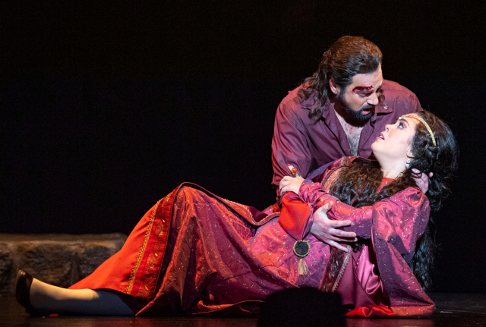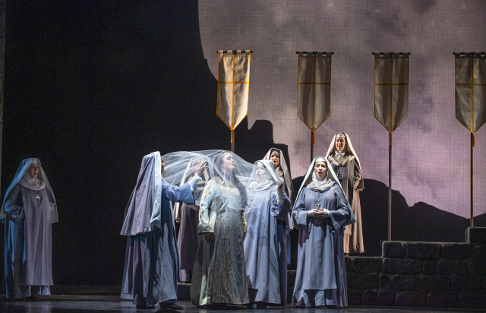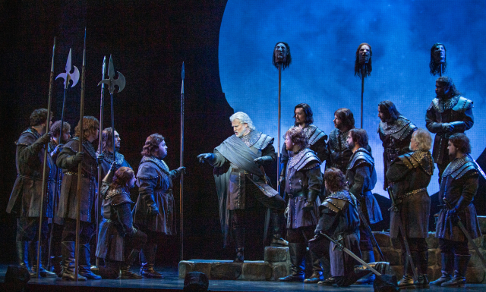![Azucena, (Daryl Freedman) describing to Manrico (Mackenzie Gotcher) her most tragic misdeed. [Photo by David Allen courtesy of Opera San José]](http://www.operatoday.com/Il-trovatore_David-Allen_6-scaled.png)
20 Feb 2020
Full-Throated Troubador Serenades San José
Verdi’s sublimely memorable melodies inform and redeem his setting of the dramatically muddled Il Trovatore, the most challenging piece to stage of his middle-period successes.
English Touring Opera are delighted to announce a season of lyric monodramas to tour nationally from October to December. The season features music for solo singer and piano by Argento, Britten, Tippett and Shostakovich with a bold and inventive approach to making opera during social distancing.
This tenth of ten Live from London concerts was in fact a recorded live performance from California. It was no less enjoyable for that, and it was also uplifting to learn that this wasn’t in fact the ‘last’ LfL event that we will be able to enjoy, courtesy of VOCES8 and their fellow vocal ensembles (more below …).
Ever since Wigmore Hall announced their superb series of autumn concerts, all streamed live and available free of charge, I’d been looking forward to this song recital by Ian Bostridge and Imogen Cooper.
Although Stile Antico’s programme article for their Live from London recital introduced their selection from the many treasures of the English Renaissance in the context of the theological debates and upheavals of the Tudor and Elizabethan years, their performance was more evocative of private chamber music than of public liturgy.
Evidently, face masks don’t stifle appreciative “Bravo!”s. And, reducing audience numbers doesn’t lower the volume of such acclamations. For, the audience at Wigmore Hall gave soprano Elizabeth Llewellyn and pianist Simon Lepper a greatly deserved warm reception and hearty response following this lunchtime recital of late-Romantic song.
For this week’s Live from London vocal recital we moved from the home of VOCES8, St Anne and St Agnes in the City of London, to Kings Place, where The Sixteen - who have been associate artists at the venue for some time - presented a programme of music and words bound together by the theme of ‘reflection’.
'Such is your divine Disposation that both you excellently understand, and royally entertaine the Exercise of Musicke.’
‘And there was war in heaven: Michael and his angels fought against the dragon; and the dragon fought and his angels, And prevailed not; neither was their place found any more in heaven … that old serpent … Satan, which deceiveth the whole world: he was cast out into the earth, and his angels were cast out with him.’
There was never any doubt that the fifth of the twelve Met Stars Live in Concert broadcasts was going to be a palpably intense and vivid event, as well as a musically stunning and theatrically enervating experience.
‘Love’ was the theme for this Live from London performance by Apollo5. Given the complexity and diversity of that human emotion, and Apollo5’s reputation for versatility and diverse repertoire, ranging from Renaissance choral music to jazz, from contemporary classical works to popular song, it was no surprise that their programme spanned 500 years and several musical styles.
The Academy of St Martin in the Fields have titled their autumn series of eight concerts - which are taking place at 5pm and 7.30pm on two Saturdays each month at their home venue in Trafalgar Square, and being filmed for streaming the following Thursday - ‘re:connect’.
The London Symphony Orchestra opened their Autumn 2020 season with a homage to Oliver Knussen, who died at the age of 66 in July 2018. The programme traced a national musical lineage through the twentieth century, from Britten to Knussen, on to Mark-Anthony Turnage, and entwining the LSO and Rattle too.
With the Live from London digital vocal festival entering the second half of the series, the festival’s host, VOCES8, returned to their home at St Annes and St Agnes in the City of London to present a sequence of ‘Choral Dances’ - vocal music inspired by dance, embracing diverse genres from the Renaissance madrigal to swing jazz.
Just a few unison string wriggles from the opening of Mozart’s overture to Le nozze di Figaro are enough to make any opera-lover perch on the edge of their seat, in excited anticipation of the drama in music to come, so there could be no other curtain-raiser for this Gala Concert at the Royal Opera House, the latest instalment from ‘their House’ to ‘our houses’.
"Before the ending of the day, creator of all things, we pray that, with your accustomed mercy, you may watch over us."
The doors at The Metropolitan Opera will not open to live audiences until 2021 at the earliest, and the likelihood of normal operatic life resuming in cities around the world looks but a distant dream at present. But, while we may not be invited from our homes into the opera house for some time yet, with its free daily screenings of past productions and its pay-per-view Met Stars Live in Concert series, the Met continues to bring opera into our homes.
Music-making at this year’s Grange Festival Opera may have fallen silent in June and July, but the country house and extensive grounds of The Grange provided an ideal setting for a weekend of twelve specially conceived ‘promenade’ performances encompassing music and dance.
There’s a “slide of harmony” and “all the bones leave your body at that moment and you collapse to the floor, it’s so extraordinary.”
“Music for a while, shall all your cares beguile.”
The hum of bees rising from myriad scented blooms; gentle strains of birdsong; the cheerful chatter of picnickers beside a still lake; decorous thwacks of leather on willow; song and music floating through the warm evening air.
![Azucena, (Daryl Freedman) describing to Manrico (Mackenzie Gotcher) her most tragic misdeed. [Photo by David Allen courtesy of Opera San José]](http://www.operatoday.com/Il-trovatore_David-Allen_6-scaled.png)
Verdi’s sublimely memorable melodies inform and redeem his setting of the dramatically muddled Il Trovatore, the most challenging piece to stage of his middle-period successes.
A wagging singsong parody of the knotty plot begins with “I’ll tell you the story of Il Trovtore.” One reason for the difficulty in following the nefarious machinations is that most of the all-important set-up has happened off stage, well before the opera’s story ever begins. So, it behooves audiences to pay particularly close attention to the Surtitles during the opening scene when the rivalry for Leonora between Manrico and the Count di Luna is explained, the introduction to the trials of the gypsy woman Azucena is laid out, along with the suggestion of a terrible secret.
Brad Dalton has chosen to stage a pantomime during the opening bars that establishes di Luna’s unholy lust for Leonora and her understandable revulsion. Mr. Dalton has staged a non-fussy, straightforward account that was admirable for its clarity and control. Stage pictures were clean and varied, although they (only) occasionally suffered from a bit of stasis.
If the characters were longer on potent vocal delivery than they were on richly detailed interaction, that is not entirely the responsibility of the director. Mr. Dalton managed to infuse sufficient life in the sometimes illogical twists and turns of Cammarano’s routine libretto to make it understandable and engaging. He even provided some compelling novel touches like having an emboldened Leonora pair with her Manrico at the close of Act I by brandishing a broadsword as if to the mission born.
 Manrico (Mackenzie Gotcher) comforting his true love, Leonora (Kerriann Otaño).
Manrico (Mackenzie Gotcher) comforting his true love, Leonora (Kerriann Otaño).
Much of OSJ’s marketing of this feature furthers a Game of Thrones dynamic, banking on that enormously popular show to help sell tickets to new audiences. The association is not misplaced, since power playing is what drives the plot. In epic fashion, the ubiquitous sword is passed and paraded ceremoniously from scene to scene, and what a satisfying scene design it is.
Steven Kemp has devised a winning variation on the “unit setting” concept, framing the space with brick legs and tormentors that not only convey imposing structures when required, but also literally frame the action with handsome detail. Within this basic look, Mr. Kemp moves about stylish steps, anvils, ramps, anvils, and well-selected set pieces that are backed by a distressed backdrop that sports a jagged rounded hole, like the outline of an oozing planet, up left.
Michael Palumbo has lit the proceedings with aplomb and colorful imagination, capitalizing on many different variations of the exclusively nighttime action of the piece. Mr. Palumbo’s areas and specials were all moody evocations of the tortured progression of the characters’ journeys. Curiously, the glow of the oncoming dawn in Act II receded to shadows for the powerful Azucena-Manrico exchange, murkily effective, but not exactly how dawn works.
Elizabeth Poindexter’s sumptuous, abundant array of costumes not only delighted the eye but also commendably informed the station of the characters. Ms. Poindexter was ably abetted by Dave Maier’s telling wig and make-up design, which complemented the historical fantasy concept. I might have wished for a more eccentric, troubled, gypsy look for Azucena, but I respect the committed decisions the team made.
 Leonora (Kerriann Otaño) who, believing her love has died, prepares to take the veil and enter a convent.
Leonora (Kerriann Otaño) who, believing her love has died, prepares to take the veil and enter a convent.
Enrico Caruso famously quipped the “all you need for a successful production (of this opus) is the four best singers in the world.” Even the world’s major houses are challenged to meet the starry demands of Il Trovatore, but if you want to know who the next major international proponents of these roles will likely be, you need not look much further than the skillful assemblage on stage at the California Theatre.
It is called The Troubador after all, and Mackenizie Gotcher was simply tremendous in the titular assignment. Mr. Gotcher is perfectly equipped to excel in the challenging role of Manrico, with his strapping good looks, ringing heavy lyric tenor, and consummate musicality. There is no aspect of this daunting assignment that eludes him, be it the stentorian thrills of “Di quell pira,” the honeyed sentiments of “Ah! si ben mio,” or the gripping exchanges with Azucena.
Gotcher has true squillo in his sizable instrument, and he lavishes Verdi’s potent writing with personality and deeply felt emotions. The road ahead seems bright indeed for this polished, poised performer. His star turn alone is worth the price of admission. Happily, he is in good company.
Mezzo Daryl Freedman is on her way to becoming a force of nature in the Zajik mold with her powerful, knowing interpretation of the willful Azucena. Ms. Freedman’s well-schooled instrument was even from top to bottom, and she knows how to knit her registers with consummate skill. With a rich, ripe middle range, a searing, pliable top, and round, booming chest tones, this treasurable vocalist found every variation of intensity in the opera’s most complex role. I hope that future outings will find this gifted interpreter delving even deeper into the dramatic subtext.
 Ferrando (Nathan Stark) ordering his men to keep watch.
Ferrando (Nathan Stark) ordering his men to keep watch.
Eugene Brancoveanu is a mellifluous, malevolent Count di Luna. His baritone is a marvel of tonal beauty, buzzing with virility, and eminently flexible. Mr. Brancoveanu invests the many repetitive confrontational declamations with admirable delineation, and he avoids the trap of barking the accented scale and arpeggiated passages. He displays enviable ease in the upper reaches of the part and finds some welcome brighter swings in the Count’s mostly dark intentions.
I only wish that this fine singer could find a bit more breath control for the Bellinian stretches of his character-defining aria, for I found that his choppy phrasing and snatched breaths somewhat defeated the beauty of the long-drawn lines of “Il balen.” Most everywhere else he excelled, no more so than in the well calibrated last act duet with Leonora, the accomplished performer Kerriann Otaño.
Ms. Otaño’s warmly radiant, substantial soprano was a lovely complement to the roster. Her Verdian sense of line and her deeply experienced, conflicted feelings were manifest in a role traversal that was long on beautifully modulated tone and knowing generosity of utterance.
Like many a famous interpreter of this difficult assignment, once past the pitfalls of successfully negotiating “Tacea la note placida” and its angular cabaletta, the soprano relaxed into a luxuriant outpouring of sound and sentiment that dominated her every appearance. Her defiant, armed stance against Manrico’s opponents spoke volumes about the depth of her theatrical resolve.
Although Caruso addressed the demands for the four principals, there is a fifth requirement for a fine Trovatore, namely Ferrando, who has the unenviable job of setting up the whole unlikely scenario in his lengthy opening appearance. Luckily, local favorite Nathan Stark conquered in that daunting responsibility, and he delivered in spades, with a potent and pointed delivery of “Di due figli.”
Mr. Stark has a sizable, pliable bass-baritone that limns the tale of two rival brothers with tragic urgency. Moreover, he commands the stage with a winning presence and cunning command of nuance. It is not often that you will encounter this opening scene invested with such artistry and dramatic interest. He is greatly assisted in his efforts by the excellent exclamations from Christopher James Ray’s well-tutored chorus, who were outstanding all evening long.
A final vital component in the evening’s success was Joseph Marcheso’s conducting of a responsive and highly skilled orchestra. Maestro Marcheso displayed full command of this almost bare bones structure of the middle Verdi canon, and he managed to invest the repetitive bass-chord-bass-chord progressions with meaningful forward motion. He also partnered his vocalists with consummate collaborative effort, even though the soloists sometimes lagged just a bit behind the beat in more urgently rapid passages.
At the end of the night, the excitable opening night audience was clearly delighted with the riveting music making and lavished the performers and creative team with a vociferous appreciation. This winning mounting of Il Trovatore is not only top professional quality, but it is also excellent entertainment value at Opera San Jose’s reasonable pricing. Come to the California theatre early and you may also get treated to a pre-show pops recital on the historic organ in the atmospheric lobby.
James Sohre
Il Trovatore
Music by Giuseppe Verdi
Libretto by Salvadore Cammarano
Leonora: Kerriann Otaño; Manrico: Mackenzie Gotcher; Count di Luna: Eugene Brancoveanu; Ferrando: Nathan Stark; Azucena: Daryl Freedman; Inez: Stephanie Sanchez; Ruiz: Mason Gates; Old Roma: Glenn Louis Healy; Messenger: Nicolas T. Gerst; Conductor: Joseph Marcheso; Director: Brad Dalton; Set Design: Steven Kemp; Costume Design: Elizabeth Poindexter; Lighting Design: Michael Palumbo; Fight Choreography: Dave Maier; Wig and Make-up Design: Christina Martin; Chorus Master: Christopher James Ray.